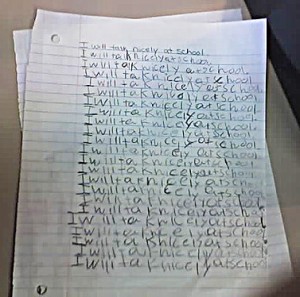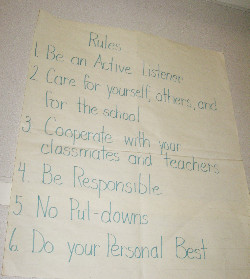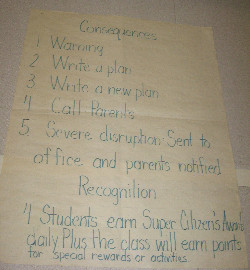 Yesterday I remembered what it feels like to get in trouble at school.
Yesterday I remembered what it feels like to get in trouble at school.
I arrived during morning recess, and immediately a group of my 3rd grade classmates accosted me, pestering me to tell them more scary stories. I hesitated, asking them whether they’d had any nightmares.
“I couldn’t go to sleep at first,” one girl said, “but I remembered that you said the stories were make-believe, and then I fell asleep.”
The end-of-recess whistles blew, and the kids and I filed into class. Ms. Alessio, a teacher who was at the school back when I was a student, asked us to take our seats because she had an important announcement.
“I got a call from a parent last night,” she began.
My stomach sank. I’d suspected that indulging the kids’ demands for scary stories had been a bad idea, and that parents might complain. An anxious feeling began growing in my chest.
 “There was apparently an incident,” Ms. Alessio said. An “incident”? I held my breath, waiting for her look of disappointment as she singled me out for having poor judgment.
“There was apparently an incident,” Ms. Alessio said. An “incident”? I held my breath, waiting for her look of disappointment as she singled me out for having poor judgment.
“Some of you were involved in a conflict yesterday,” she continued, “and I need to talk to you outside.” I felt relieved, my breath returning and my tense muscles relaxing. Thank goodness I wasn’t the one in trouble. However, the unfortunate folks involved in the conflict were in trouble, and they had to spend their lunch recess inside.
Until Ms. Alessio’s announcement, I had forgotten what it was like to sense the impending doom of punishment, to feel the fear building in the pit of my stomach, the torturous waiting much worse than the verdict. Experiencing that for even just a few moments brought back memories of being reprimanded: feeling humiliated when all eyes turned to look at me — the example of what not to do — and deeply troubled by having let the teacher down.
Since “being good” in school was my strong suit, I can recall only a couple of times where I was punished in elementary school:
- Kindergarten, age 5. It must have been the end of the day, since the chairs had been piled on the tables. I had committed some offense and had been instructed to sit behind the stacked chairs, away from the other kids, who were listening to a story on the rug. I remember miserably peeking through the chairs, as if through prison bars, and feeling powerless against what I believed to be unfair.
- 2nd grade, age 7. My teacher often gave me the privilege of correcting papers at a table in the back of the classroom once I finished my work. One of the boys approached me and said, “When I get to correct papers, I’m going to put ‘Very Poor’ on all the girls’ homework.” I decided that I’d teach him to mess with girls, so I added “Very Poor” and a frowny face to all of the boys’ papers in fine-tipped green marker, even those earning 100%. When a boy told on me, the teacher was extremely disappointed and announced my abuse of power to the class. I vividly remember staring at the ground, feeling the regret and shame of being a good girl who got in bad trouble in front of everyone.
 Most adults I’ve talked with, from 20-somethings to 80-somethings, still remember being punished in school. For some, the experience changed them forever, particularly if they believed the punishment to be unjust. My friend Jonah, who now directs several alternative education programs in New York, wrote an essay called “Middle School Dropout” about an unfair suspension (or “sentence,” in his words) for a minor quarrel with a classmate in 6th grade. The vice principal had made up his mind to suspend the two boys before even listening to their point of view, and without justifying his reasons for the punishment. After two days away from school, Jonah returned with a new perpsective:
Most adults I’ve talked with, from 20-somethings to 80-somethings, still remember being punished in school. For some, the experience changed them forever, particularly if they believed the punishment to be unjust. My friend Jonah, who now directs several alternative education programs in New York, wrote an essay called “Middle School Dropout” about an unfair suspension (or “sentence,” in his words) for a minor quarrel with a classmate in 6th grade. The vice principal had made up his mind to suspend the two boys before even listening to their point of view, and without justifying his reasons for the punishment. After two days away from school, Jonah returned with a new perpsective:
It was as though the wool had been pulled from over my eyes. Everything became clear, the ridiculousness of it all. It was then that I realized school was not the place for me. I may not yet have been able to spell the word bureaucracy, but I knew very well what it meant and what it implied…From that moment on, I could never look at school the same again. I could no longer be a passive student receiving an education.
After that I couldn’t go back…I had completely dropped out [mentally] but I kept showing up every day, going to my classes and doing the bare minimum amount of work needed to get by. And that’s what I did… I got by.
This experience in particular drives Jonah to give other students a different school experience than he had. He encourages schools to listen to students and give them ownership over their education, so they don’t disengage, like he did.
Whenever I observe a child being punished in school, I wonder what kind of impression the experience is making on him. I wonder about the effect it will have on his self-image and behavior, and about the underlying cause of the “acting out.” Boredom? Trouble at home? The need to feel important? I wonder, too, if he’ll remember it for the rest of his life, and if it will somehow affect his decisions in the future.
What punishments in school do you remember clearly even today? How do you think they changed you?
Flickr Creative Commons image courtesy of Liz Henry.
I made it through 13 years of school without ever being singled out. I don’t think that’s necessarily an accomplishment. I came from a relatively rule-free, “let’s talk calmly about why you’re doing that” household, so I was terrified of getting in trouble. I remember crying almost every day in the first grade because I had a screamer for a teacher and, even if she was yelling at the whole class, I felt like it was addressed at me. In my six years, I had never been spoken to in that manner, and there’s something about an angry, red-faced, towering adult that is really terrifying. She would also employ other awesome fear tactics, such as canceling fun activities for the whole class if one kid spoke out of turn.
I remember being praised for being so quiet and well-behaved, but really I was just scared to move or talk. This woman obviously hated kids, and teaching was not her passion. I wish I could say that was the only time I ever felt that way but apart from one fabulous fourth-grade teacher, terror was pretty much a continuous theme up through middle school. It was like that was the only way these tired, worn-out teachers knew to keep their classes under control. Except that it only created more chaos and misbehavior.
I like how you refer to the child being punished in school as a boy. I wonder if that was conscious.
There was an incident that also made me realize the whole “schooling” concept was just a manifestation of bureaucracy too. Middle school, 7th grade. It was during the 10 minute period in between classes, and I had showed up to Spanish class early, which at that time meant more than 15 seconds before the bell rang. I was chatting with a buddy of mine and I said the word “Damn”. Teacher then proceeds to give me two detentions without warning. Completely marred my perfect record, and from there it continued on a downward spiral to the point where detentions meant absolutely nothing to me, almost like a swift slap of the wrist. Mind you, I was never suspended, but I decided from that point forward that any teacher who decided to give me such obscure punishments would lose my respect and their authority.
Some teachers must have hated me, but the ones who were able to reach me were my idols. As a matter of fact, they still are.
Wow, Katie, you had some intense teachers. I know what you mean about certain teachers just hating kids and their job — do something else, for godssakes! The whole concept of “control” should never be applied to people (to pests, maybe). I can’t stand that word. There’s no need for it in respect-based, rather than fear-based, teaching and parenting. I agree that so many of the “good” kids, with their folded hands and zipped lips, are scared into acting like robots. As my friend Adam likes to say, “Democracy is noisy.”
Stephen, yep, I was conscious when choosing to use a boy in my example. As a grammar nerd, I could never refer to a child as “they,” so I just had to choose “he” or “she.” In my experience, it’s the boys who often “act out” in a rowdy way.
About your punishment, I wish that adults would just treat kids with the same respect they give other adults, and follow the same rules. How would your teacher react if one of the other teachers swore in the classroom? Raise the eyebrows or give a joking reprimand? The “How would I treat a peer in this situation?” test is one that parents and teachers should use more often when interacting with kids. (And come on, “damn” is really just not worth raising a stink about.)